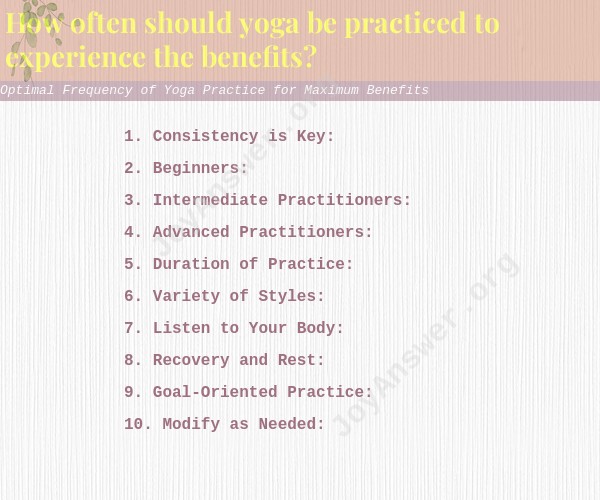How often should yoga be practiced to experience the benefits?
The optimal frequency of yoga practice for maximum benefits can vary depending on individual goals, fitness level, and lifestyle. Yoga offers a wide range of physical, mental, and emotional benefits, and the frequency that works best for one person may differ for another. Here are some general guidelines to consider:
1. Consistency is Key:Consistency in yoga practice is important. It's often better to practice regularly, even if for shorter durations, rather than sporadically for longer sessions.
2. Beginners:If you're new to yoga, starting with 2-3 times a week is a good approach. This allows your body to adapt to the practice and helps you build strength, flexibility, and familiarity with the poses.
3. Intermediate Practitioners:For those who have been practicing for a while, 3-5 times a week can provide substantial benefits. This frequency allows for deeper exploration of poses, improved alignment, and enhanced mind-body connection.
4. Advanced Practitioners:Advanced practitioners might choose to practice daily or even multiple times a day. However, it's essential to listen to your body and balance intensity with adequate rest and recovery.
5. Duration of Practice:The duration of each yoga session matters. Aim for at least 20-30 minutes per session to allow time for warm-up, poses, and relaxation.
6. Variety of Styles:Incorporating different styles of yoga, such as vinyasa, hatha, restorative, or yin, can provide a well-rounded practice and prevent burnout.
7. Listen to Your Body:Pay attention to how your body responds to your practice. If you feel fatigued or strained, take a rest day or practice a gentler style.
8. Recovery and Rest:Rest days are crucial. Your body needs time to recover, and practicing yoga every day without rest can lead to overuse injuries.
9. Goal-Oriented Practice:If you have specific goals, such as stress reduction, flexibility improvement, or strength building, you might adjust the frequency accordingly. For instance, stress reduction might benefit from daily practice, while muscle recovery might be better suited for fewer sessions per week.
10. Modify as Needed:Life circumstances can affect your practice. Sometimes you might practice more frequently, and other times you might need to scale back. Be flexible and adapt your practice to your schedule and energy levels.
Remember that the benefits of yoga extend beyond physical aspects. Regular practice can enhance mental clarity, stress management, and overall well-being. It's also important to consult with a healthcare professional, especially if you have any underlying health conditions or concerns. Ultimately, the best frequency of practice is one that feels sustainable, enjoyable, and supportive of your overall health and goals.












